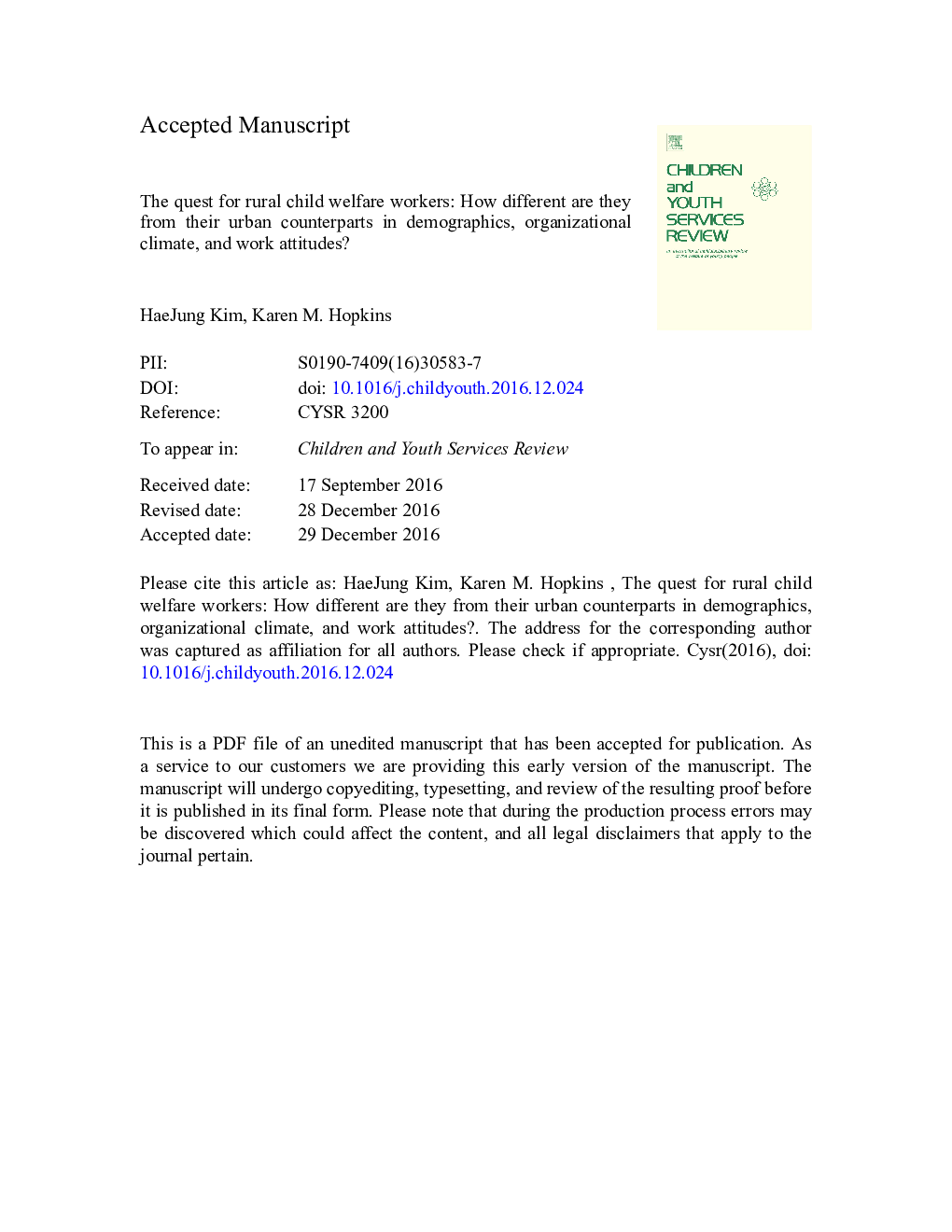| کد مقاله | کد نشریه | سال انتشار | مقاله انگلیسی | نسخه تمام متن |
|---|---|---|---|---|
| 4936588 | 1434436 | 2017 | 34 صفحه PDF | دانلود رایگان |
عنوان انگلیسی مقاله ISI
The quest for rural child welfare workers: How different are they from their urban counterparts in demographics, organizational climate, and work attitudes?
ترجمه فارسی عنوان
تلاش برای کارگران رفاهی کودکان روستایی: آیا آنها از همتایان شهری خود در جمعیت شناسی، جو سازمان یافته و نگرش کار متفاوتند؟
دانلود مقاله + سفارش ترجمه
دانلود مقاله ISI انگلیسی
رایگان برای ایرانیان
کلمات کلیدی
آب و هوای سازمانی، روستایی، رفاه کودکان، تعهد سازمانی، رضایت شغلی،
ترجمه چکیده
استخدام و نگهداری کارگران رفاه کودکان در جوامع روستایی به عنوان مشکلات اصلی مطرح شده است. گرچه تحقیقات در مورد فرهنگ سازمانی و محیط زیست در رفاه کودکان انجام شده است، در مورد نگرش سازمانی و نگرش کارکنان در ادارات رفاه روستایی روستا و اینکه چگونه این ممکن است با سازمان های شهری متفاوت باشد، شناخته شده است. با استفاده از چارچوب نظری گلیسون، هدف این مطالعه بررسی تفاوت های جو سازمانی در مناطق روستایی و شهری است. نتایج نشان داد که کارگران روستایی سطح پایین تر استرس شغلی و رشد و پیشرفت بیشتر، وضوح نقش و تعهد سازمانی را نسبت به کارگران شهری گزارش کردند. نتایج تحلیل رگرسیون چندگانه نشان داد که عوامل مختلف با نگرش کارکنان رفاهی کارکنان شهری و روستایی ارتباط دارد. در مقایسه با همتایان شهری، کارکنان روستایی کودکان کارآفرینانه با همکاری و همکاری با همکاران بیشتر، انتظارات واضح تر و منابع کافی و فرصت های رشد و ارتقاء حرفه ای را به ارمغان می آورند. یافته های این تحقیق نشان می دهد که استراتژی های مدیریتی متفاوت برای ارتقاء جو سازماندهی می بایست با توجه به اینکه محیط کار روستایی یا شهری است، مورد نیاز است.
موضوعات مرتبط
علوم پزشکی و سلامت
پزشکی و دندانپزشکی
پریناتولوژی (پزشکی مادر و جنین)، طب اطفال و بهداشت کودک
چکیده انگلیسی
Recruiting and retaining child welfare workers in rural communities have been noted as major problems. Although there has been research on organizational culture and climate in child welfare, little is known about organizational climate and work attitudes in rural child welfare agencies and how these may differ from urban agencies. Using Glisson's theoretical framework, the purpose of this study is to explore the differences in organizational climate between rural and urban areas. Results showed that rural workers reported lower levels of job stress and higher growth and advancement, role clarity, and organizational commitment than urban workers. The results of multiple regression analysis showed different factors were associated with urban and rural child welfare workers' work attitudes. Compared with their urban counterparts, rural child welfare workers appear to value cooperation and collaboration with coworkers more highly, have clearer expectations and adequate resources, and opportunities for professional growth and promotion. The findings suggest that different managerial strategies may be needed to enhance the organizational climate depending on whether the work setting is rural or urban.
ناشر
Database: Elsevier - ScienceDirect (ساینس دایرکت)
Journal: Children and Youth Services Review - Volume 73, February 2017, Pages 291-297
Journal: Children and Youth Services Review - Volume 73, February 2017, Pages 291-297
نویسندگان
HaeJung Kim, Karen M. Hopkins,
